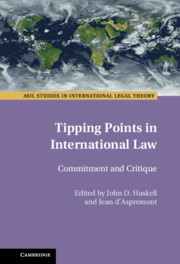Book contents
- Tipping Points in International Law
- ASIL Studies in International Legal Theory
- Tipping Points in International Law
- Copyright page
- Contents
- Contributors
- Acknowledgments
- 1 Experiencing Tipping Points in International Law
- 2 The Literary Performances of the Tipping Point
- 3 Authoritarianism
- 4 China
- 5 Democracy
- 6 Development
- 7 Digital
- 8 Environment
- 9 Health
- 10 Human Rights
- 11 Labor
- 12 Liberation
- 13 Multilateralism
- 14 Race
- 15 Religion
- 16 Rule of Law
- 17 Russia
- 18 Systems
- 19 Territory
- 20 United Nations
- 21 Universalism
- Index
1 - Experiencing Tipping Points in International Law
Published online by Cambridge University Press: 23 October 2021
- Tipping Points in International Law
- ASIL Studies in International Legal Theory
- Tipping Points in International Law
- Copyright page
- Contents
- Contributors
- Acknowledgments
- 1 Experiencing Tipping Points in International Law
- 2 The Literary Performances of the Tipping Point
- 3 Authoritarianism
- 4 China
- 5 Democracy
- 6 Development
- 7 Digital
- 8 Environment
- 9 Health
- 10 Human Rights
- 11 Labor
- 12 Liberation
- 13 Multilateralism
- 14 Race
- 15 Religion
- 16 Rule of Law
- 17 Russia
- 18 Systems
- 19 Territory
- 20 United Nations
- 21 Universalism
- Index
Summary
Things always have more than one beginning. It was one of those slightly cold days for my California blood, but this was northwest England and what would be described by locals as a pleasant afternoon in early 2017. The Manchester International Law Centre had arranged a two-day event, inviting colleagues to talk shop around formal panels and catch up on the latest professional gossip and personal updates over drinks and meals. Walking out from the sessions, Mortimer Sellers mentioned in conversation that the American Society of International Law (ASIL) Interest Group in International Legal Theory runs a series with Cambridge University Press. Maybe Jean and I would be interested to put together a proposal for an edited volume, and if we could land some funding, there might even be an occasion to host a workshop for authors at the ASIL Washington DC headquarters.
- Type
- Chapter
- Information
- Tipping Points in International LawCommitment and Critique, pp. 1 - 25Publisher: Cambridge University PressPrint publication year: 2021

